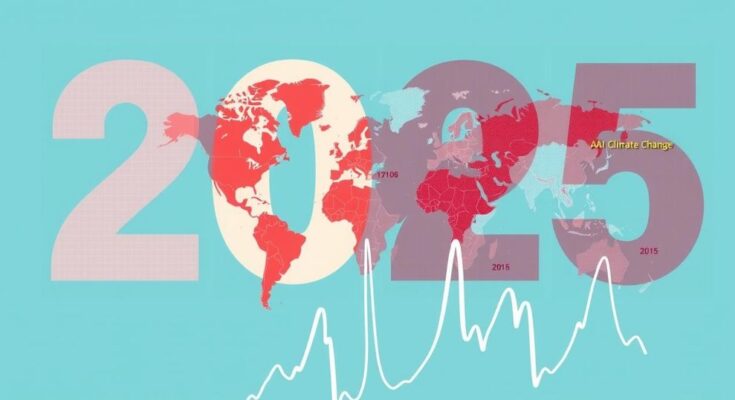As we approach 2025, inflation, AI job losses, climate change, and immigration concerns continue to shape public sentiment. Many express cautious optimism, with a recent survey indicating 71% anticipate a better year ahead. Key issues include the expectation of rising prices, potential tax increases, and complex feelings surrounding immigration and technological advancements.
Concerns regarding inflation, job displacement due to artificial intelligence, climate change, and immigration remain prevalent as we approach 2025. Despite these challenges, a sense of cautious optimism is emerging among global populations. A survey reflecting the views of 23,721 adults, conducted across 33 countries, indicates that 71% of respondents believe that the upcoming year will be an improvement over the previous one, marking a slight increase from 2024. This reveals a gradual shift in sentiment, as economic stability and societal anxieties persist.
The survey demonstrates a reduction in negativity regarding the recent past; only 51% of individuals now characterize 2024 as a bad year for their families, down from 53% in 2023, while the perception of it as a poor year for their countries has decreased to 65% from 70%. This suggests resilience among the public amidst ongoing cost-of-living crises and geopolitical tensions.
Inflation remains a primary concern, with 79% forecasting that prices will continue to outpace income growth in 2025, a trend observed since 2022. A significant proportion, 74%, also anticipates tax increases as a reflection of continuing financial pressures. Contrarily, expectations for rising interest rates have declined, indicating a belief that monetary policies may start to ease.
In the United States, particularly among the Latino community, there is a shared apprehension about job losses attributed to AI technologies, with 65% voicing concerns. However, a notable 43% view technological advancements as a potential source of new opportunities. Similar sentiments are echoed in Latin America, where inflation and unemployment dominate public worries, though optimism for economic stabilization exists in countries like Brazil and Argentina.
Immigration remains a divisive issue, with 67% of respondents expecting an increase in immigration to their countries in 2025, a slight decrease from 71% in 2024. Disparities in perceptions are evident; for instance, a high percentage of respondents in Turkey (84%) and Spain (80%) expect a rise in immigration, compared to lower expectations in the United States (56%) and Canada (55%). This disparity illustrates how public perceptions are often influenced more by societal anxieties and political discourse than by migration realities.
The duality of technological advancement yields concerns of job displacement alongside hopes for innovation across various sectors, such as healthcare, where 40% of individuals believe a cancer cure may soon be attainable. Environmental fears continue to loom, with 80% predicting increasing global temperatures and 72% foreseeing a rise in extreme weather events. However, faith in government action to combat climate change appears to be waning, with only 52% of respondents expecting stricter carbon emission targets, a decline of 3 percentage points from the previous year.
As we transition into 2025, global populations grapple with significant issues such as inflation, artificial intelligence-induced job losses, climate change, and immigration rates. The backdrop of ongoing economic uncertainty and societal concerns enhances the complexity of these topics, compelling individuals and communities worldwide to reevaluate their expectations for the future. Polling data reflecting diverse perspectives across multiple countries can offer valuable insights into the overarching public sentiment and the anticipated socio-economic landscape.
In summary, while inflation and job displacement concerns dominate the current landscape as we approach 2025, the emergence of cautious optimism among global populations is noteworthy. Survey results reflect a gradual shift in public sentiment, with declining perceptions of recent negative experiences and some hopeful outlooks for economic and societal stabilization. However, persistent fears surrounding technological advancements and environmental challenges underline the complexity of navigating these global issues.
Original Source: www.latintimes.com




